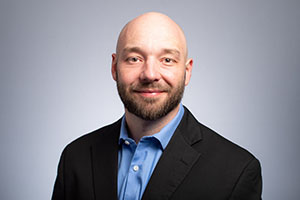By Stefan Tuomanen Welcome to another UAB Faculty spotlight. This month we are featuring Dr. Eric Ubil, PhD, MBA.
Welcome to another UAB Faculty spotlight. This month we are featuring Dr. Eric Ubil, PhD, MBA.
Dr. Ubil joined our department as a new Assistant Professor back in August after finishing his postdoctoral tenure at UNC Chapel Hill. Dr. Ubil was initially attracted to the University of Alabama Microbiology department by the outstanding quality of its research and its collaborative spirit. He is very grateful for the support and encouragement he has received while setting up of his lab. A cell biologist and physiologist, Dr. Ubil is involved in basic research on tumor-mediated innate immune suppression pathways. More specifically, he is interested in advancing and developing novel cancer therapies by preventing these immune-suppressing secretions from hindering pro-inflammatory macrophage functions.
Unfortunately, many tumors are quite effective at hindering our body’s innate immune response. One of the most effective ways they do this is through the secretion of proteins that can reduce immune response effectiveness – in some cases by up to 50%. Dr. Ubil’s research mainly concerns a secreted protein that is commonly expressed by tumors: Pros 1. When a tumor secretes Pros-1, it blocks the activation of the pro-inflammatory M1 macrophage response in the tumor microenvironment. Understandably, if there is a way to stop this secretion production in tumors or limit its effect on immune cells, our immune response would be much better at doing its job. Dr. Ubil explained this by way of a gas and brake pedal analogy. “Our immune system is the car and the macrophages are pressing on the gas while the cancer is actively pressing on the brake. I want to take cancer’s foot off of the brake.” Dr. Ubil continued by emphasizing the benefits of such a therapy when used in conjunction with other therapy modalities like chemo and radiation therapy. While chemo and/or radiation therapy can be very effective at eradicating most if not all cancer cells, “our body needs to keep its foot on the gas.” That is to say: surviving tumor cells still secrete Pros1 and protect the remaining tumor cells from the immune response. By preventing the surviving tumor cells from suppressing the immune response we may be able to make chemotherapy more effective. The long-term goal of this research would be the creation of a novel cancer therapy akin to the pioneering PD- 1/PD-L1 immunotherapy.
It is worth mentioning, particularly for young researchers coming into his lab, Dr. Ubil has 10 years of industry experience. He said this experience taught him to always clearly define your projects goals and to keep said-goals in mind throughout all stages of a project. Ultimately, we are excited to welcome Dr. Ubil into our department and look forward to his lab’s endeavors.